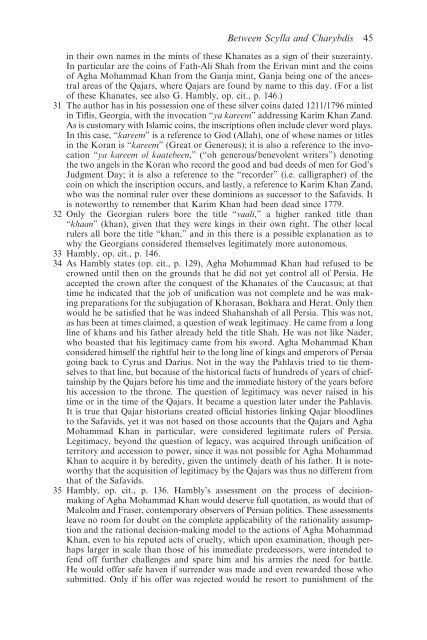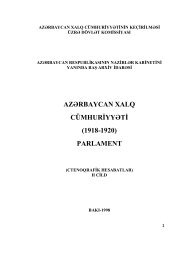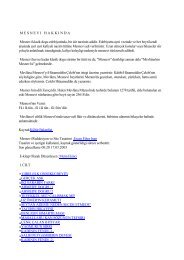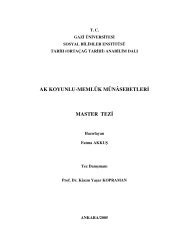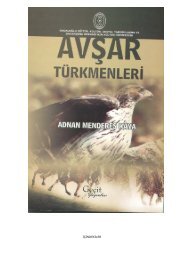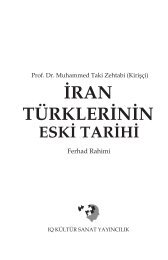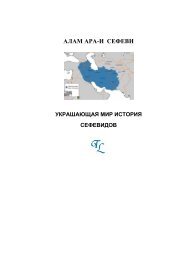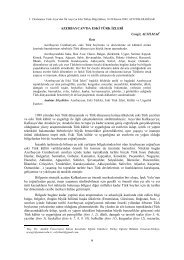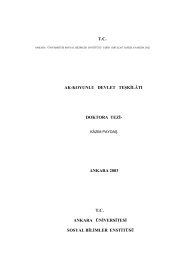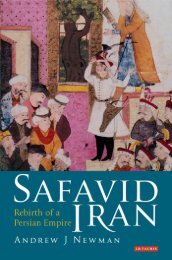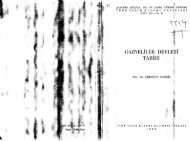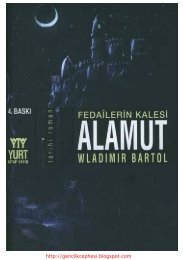Between Scylla <strong>and</strong> Charybdis 45<strong>in</strong> their own names <strong>in</strong> the m<strong>in</strong>ts of these Khanates as a sign of their suzera<strong>in</strong>ty.In particular are the co<strong>in</strong>s of Fath-Ali Shah from the Erivan m<strong>in</strong>t <strong>and</strong> the co<strong>in</strong>sof Agha Mohammad Khan from the Ganja m<strong>in</strong>t, Ganja be<strong>in</strong>g one of the ancestralareas of the <strong>Qajar</strong>s, where <strong>Qajar</strong>s are found by name to this day. (For a listof these Khanates, see also G. Hambly, op. cit., p. 146.)31 The author has <strong>in</strong> his possession one of these silver co<strong>in</strong>s dated 1211/1796 m<strong>in</strong>ted<strong>in</strong> Tiflis, Georgia, with the <strong>in</strong>vocation “ya kareem” address<strong>in</strong>g Karim Khan Z<strong>and</strong>.As is customary with Islamic co<strong>in</strong>s, the <strong>in</strong>scriptions often <strong>in</strong>clude clever word plays.In this case, “kareem” is a reference to God (Allah), one of whose names or titles<strong>in</strong> the Koran is “kareem” (Great or Generous); it is also a reference to the <strong>in</strong>vocation“ya kareem ol kaatebeen,” (“oh generous/benevolent writers”) denot<strong>in</strong>gthe two angels <strong>in</strong> the Koran who record the good <strong>and</strong> bad deeds of men for God’sJudgment Day; it is also a reference to the “recorder” (i.e. calligrapher) of theco<strong>in</strong> on which the <strong>in</strong>scription occurs, <strong>and</strong> lastly, a reference to Karim Khan Z<strong>and</strong>,who was the nom<strong>in</strong>al ruler over these dom<strong>in</strong>ions as successor to the Safavids. Itis noteworthy to remember that Karim Khan had been dead s<strong>in</strong>ce 1779.32 Only the Georgian rulers bore the title “vaali,” a higher ranked title than“khaan” (khan), given that they were k<strong>in</strong>gs <strong>in</strong> their own right. The other localrulers all bore the title “khan,” <strong>and</strong> <strong>in</strong> this there is a possible explanation as towhy the Georgians considered themselves legitimately more autonomous.33 Hambly, op. cit., p. 146.34 As Hambly states (op. cit., p. 129), Agha Mohammad Khan had refused to becrowned until then on the grounds that he did not yet control all of <strong>Persia</strong>. Heaccepted the crown after the conquest of the Khanates of the Caucasus; at thattime he <strong>in</strong>dicated that the job of unification was not complete <strong>and</strong> he was mak<strong>in</strong>gpreparations for the subjugation of Khorasan, Bokhara <strong>and</strong> Herat. Only thenwould he be satisfied that he was <strong>in</strong>deed Shahanshah of all <strong>Persia</strong>. This was not,as has been at times claimed, a question of weak legitimacy. He came from a longl<strong>in</strong>e of khans <strong>and</strong> his father already held the title Shah. He was not like Nader,who boasted that his legitimacy came from his sword. Agha Mohammad Khanconsidered himself the rightful heir to the long l<strong>in</strong>e of k<strong>in</strong>gs <strong>and</strong> emperors of <strong>Persia</strong>go<strong>in</strong>g back to Cyrus <strong>and</strong> Darius. Not <strong>in</strong> the way the Pahlavis tried to tie themselvesto that l<strong>in</strong>e, but because of the historical facts of hundreds of years of chiefta<strong>in</strong>shipby the <strong>Qajar</strong>s before his time <strong>and</strong> the immediate history of the years beforehis accession to the throne. The question of legitimacy was never raised <strong>in</strong> histime or <strong>in</strong> the time of the <strong>Qajar</strong>s. It became a question later under the Pahlavis.It is true that <strong>Qajar</strong> historians created official histories l<strong>in</strong>k<strong>in</strong>g <strong>Qajar</strong> bloodl<strong>in</strong>esto the Safavids, yet it was not based on those accounts that the <strong>Qajar</strong>s <strong>and</strong> AghaMohammad Khan <strong>in</strong> particular, were considered legitimate rulers of <strong>Persia</strong>.Legitimacy, beyond the question of legacy, was acquired through unification ofterritory <strong>and</strong> accession to power, s<strong>in</strong>ce it was not possible for Agha MohammadKhan to acquire it by heredity, given the untimely death of his father. It is noteworthythat the acquisition of legitimacy by the <strong>Qajar</strong>s was thus no different fromthat of the Safavids.35 Hambly, op. cit., p. 136. Hambly’s assessment on the process of decisionmak<strong>in</strong>gof Agha Mohammad Khan would deserve full quotation, as would that ofMalcolm <strong>and</strong> Fraser, contemporary observers of <strong>Persia</strong>n politics. These assessmentsleave no room for doubt on the complete applicability of the rationality assumption<strong>and</strong> the rational decision-mak<strong>in</strong>g model to the actions of Agha MohammadKhan, even to his reputed acts of cruelty, which upon exam<strong>in</strong>ation, though perhapslarger <strong>in</strong> scale than those of his immediate predecessors, were <strong>in</strong>tended tofend off further challenges <strong>and</strong> spare him <strong>and</strong> his armies the need for battle.He would offer safe haven if surrender was made <strong>and</strong> even rewarded those whosubmitted. Only if his offer was rejected would he resort to punishment of the
46 Manoutchehr M. Esk<strong>and</strong>ari-<strong>Qajar</strong>vanquished as a lesson for future challengers, <strong>and</strong> he stayed consistent <strong>in</strong> the applicationof this tactic. His foes knew they had a chance to surrender with m<strong>in</strong>imalnegative consequences, but if they did not <strong>and</strong> were defeated, they would haveto face terrible consequences. (See for <strong>in</strong>stance Agha Mohammad Khan’s letterto Erekle II mentioned <strong>in</strong> Hassan Fassa’i’s Farsnameh-ye Nasseri, translated fromthe <strong>Persia</strong>n by Heribert Busse as History of <strong>Persia</strong> Under <strong>Qajar</strong> Rule (New York:Columbia University Press, 1972), p. 66 <strong>and</strong> <strong>in</strong> Hambly’s account, op. cit., pp.127–8.) Agha Mohammad Khan acted aga<strong>in</strong>st his own immediate duty of aveng<strong>in</strong>gthe murder of his father by mak<strong>in</strong>g peace with his sworn enemies, the Davaluat Varam<strong>in</strong> <strong>in</strong> 1779, the s<strong>in</strong>gular event that guaranteed his accession without <strong>in</strong>ternalchallenge from the Qovanlu’s most dangerous enemies with<strong>in</strong> the <strong>Qajar</strong> tribe.36 Firoozeh Kashani-Sabet, op. cit., p. 19. Kashani-Sabet relates the fictitiousaccount of Etemad Saltaneh, known as Khalseh or Khaabnameh, <strong>in</strong> which he praisesthe “country-conquer<strong>in</strong>g” attributes of Iranian k<strong>in</strong>gs, <strong>and</strong> makes “countryconquer<strong>in</strong>g”the yardstick <strong>and</strong> measure of good k<strong>in</strong>gship.37 Denis Wright, The English Amongst the <strong>Persia</strong>ns: Imperial Lives <strong>in</strong> N<strong>in</strong>eteenth-Century Iran, 2nd edn (London: I. B. Tauris, 2001), pp. 4–5.38 Hambly, op. cit., pp. 146–7.39 Ingram, op. cit., p. 2.40 Iradj Am<strong>in</strong>i, Napoleon <strong>and</strong> <strong>Persia</strong>: Franco-<strong>Persia</strong>n Relations under the FirstEmpire (Wash<strong>in</strong>gton, DC: Mage Publishers, 1999), p. 41.41 Ibid., p. 42.42 Ibid., p. 110.43 Ibid., p. 111.44 Ibid., p. 157.45 Ibid., pp. 181–2.46 Ibid., p. 184.47 Wright, op. cit., p. 15. In this connection, Laurence Kelly relates the first meet<strong>in</strong>gbetween Griboyedov <strong>and</strong> Abbas Mirza <strong>in</strong> 1819, where Abbas Mirza askedGriboyedov to expla<strong>in</strong> the purported advantages <strong>Persia</strong> was deriv<strong>in</strong>g from theTreaty of Golestan. Kelly characterizes Abbas Mirza’s question as “a questiondifficult to answer” for Griboyedov. (Diplomacy <strong>and</strong> Murder <strong>in</strong> Tehran: Alex<strong>and</strong>erGriboyedov <strong>and</strong> Imperial Russia’s Mission to the Shah of <strong>Persia</strong> (London: I. B.Tauris, 2002), p. 64.)48 See Graham Williamson <strong>in</strong> this volume, who underl<strong>in</strong>es this po<strong>in</strong>t <strong>in</strong> referenceto the Turko-<strong>Persia</strong>n war of 1823, ma<strong>in</strong>ta<strong>in</strong><strong>in</strong>g that Fath-Ali Shah was opposedto both Abbas Mirza <strong>and</strong> Mohammad Ali Mirza cont<strong>in</strong>u<strong>in</strong>g their campaigns aga<strong>in</strong>stthe Ottomans even though they were both <strong>in</strong> positions of advantage, <strong>and</strong> pressuredthem to reach agreements that would ensure the cessation of hostilities. Critics,such as Edward Ingram, consider this a weakness of character. “Always more<strong>in</strong>terested <strong>in</strong> the permanence of a settlement than the terms of it, Fath Ali evenpromized to accept whatever terms Napoleon should agree to on his behalf”(Ingram, op. cit., p. 106). What Ingram does not expla<strong>in</strong>, but f<strong>in</strong>ds force <strong>in</strong> prospecttheory, is that this was a calculated policy on the part of Fath-Ali Shah ratherthan a weakness. This is exactly what the theory would predict as rational behavior<strong>in</strong> actors who wish to ma<strong>in</strong>ta<strong>in</strong> their ga<strong>in</strong>s!
- Page 2 and 3:
War and Peace in Qajar PersiaPersia
- Page 4 and 5:
War and Peace inQajar PersiaImplica
- Page 6 and 7:
ContentsList of figuresContributors
- Page 8 and 9: Figures5.1 Omani enclaves 1305.2 Ar
- Page 10 and 11: Contributor listMansoureh Ettehadie
- Page 12: AcknowledgementsThis volume grew ou
- Page 15 and 16: 2 Roxane Farmanfarmaianrepresented
- Page 17 and 18: 4 Roxane Farmanfarmaianchapter in t
- Page 19 and 20: 6 Roxane FarmanfarmaianThus, two si
- Page 21 and 22: 8 Roxane Farmanfarmaiangaining grea
- Page 23 and 24: 10 Roxane Farmanfarmaiantough deals
- Page 25 and 26: 12 Roxane FarmanfarmaianIranian geo
- Page 27 and 28: 14 Peter W. Averyin Shiraz and cont
- Page 29 and 30: 16 Peter W. Averybut the invasion w
- Page 32: Part IWar
- Page 35 and 36: 22 Manoutchehr M. Eskandari-Qajarth
- Page 37 and 38: 24 Manoutchehr M. Eskandari-Qajarap
- Page 39 and 40: 26 Manoutchehr M. Eskandari-Qajarmi
- Page 41 and 42: 28 Manoutchehr M. Eskandari-Qajarth
- Page 43 and 44: 30 Manoutchehr M. Eskandari-Qajardo
- Page 45 and 46: 32 Manoutchehr M. Eskandari-QajarIn
- Page 47 and 48: 34 Manoutchehr M. Eskandari-Qajarco
- Page 49 and 50: 36 Manoutchehr M. Eskandari-QajarTh
- Page 51 and 52: 38 Manoutchehr M. Eskandari-Qajarth
- Page 53 and 54: 40 Manoutchehr M. Eskandari-Qajarth
- Page 55 and 56: 42 Manoutchehr M. Eskandari-Qajarop
- Page 57: 44 Manoutchehr M. Eskandari-Qajarbe
- Page 61 and 62: 48 Stephanie Cronincapacity and res
- Page 63 and 64: 50 Stephanie Croninforces of the es
- Page 65 and 66: 52 Stephanie CroninPART ONE: THE QA
- Page 67 and 68: 54 Stephanie Croninprincipally on h
- Page 69 and 70: 56 Stephanie CroninThe French offic
- Page 71 and 72: 58 Stephanie CroninEuropean alignme
- Page 73 and 74: 60 Stephanie Croninthe authorities
- Page 75 and 76: 62 Stephanie Croninin the revolutio
- Page 77 and 78: 64 Stephanie Croninof power and sta
- Page 79 and 80: 66 Stephanie Croninliving and the m
- Page 81 and 82: 68 Stephanie Croninconsequences for
- Page 83 and 84: 70 Stephanie Croninrevolution was a
- Page 85 and 86: 72 Stephanie CroninNew British miss
- Page 87 and 88: 74 Stephanie CroninBrigade to a Div
- Page 89 and 90: 76 Stephanie Croninwithout the sove
- Page 91 and 92: 78 Stephanie Croninaccounting devic
- Page 93 and 94: 80 Stephanie Croninbut also faced a
- Page 95 and 96: 82 Stephanie Cronindetermined on th
- Page 97 and 98: 84 Stephanie Cronin15 For a discuss
- Page 99 and 100: 86 Stephanie Cronin55 The Anglo-Rus
- Page 101 and 102: 3 The Turko-Persian War1821-1823Win
- Page 103 and 104: 90 Graham WilliamsonThe resultant w
- Page 105 and 106: 92 Graham Williamsonprovincial forc
- Page 107 and 108: 94 Graham WilliamsonThe field armyO
- Page 109 and 110:
96 Graham Williamsonnot hold out mu
- Page 111 and 112:
98 Graham Williamsonoften in arrear
- Page 113 and 114:
100 Graham Williamsonthan any desig
- Page 115 and 116:
102 Graham WilliamsonThere were ove
- Page 117 and 118:
104 Graham Williamsonone should not
- Page 119 and 120:
Table 3.2 Persian regional armies (
- Page 121 and 122:
108 Graham WilliamsonIranian influe
- Page 123 and 124:
4 Social networks andborder conflic
- Page 125 and 126:
112 Vanessa MartinPersian troops on
- Page 127 and 128:
114 Vanessa Martinof comparatively
- Page 129 and 130:
116 Vanessa MartinTHE ROLE OF SOCIA
- Page 131 and 132:
118 Vanessa MartinThe Shah’s negl
- Page 133 and 134:
120 Vanessa Martinborder or any oth
- Page 135 and 136:
122 Vanessa Martin44 No. 38, 2 June
- Page 138 and 139:
5 The consolidation of Iran’sfron
- Page 140 and 141:
Consolidation of Iran’s frontier
- Page 142 and 143:
Consolidation of Iran’s frontier
- Page 144 and 145:
Consolidation of Iran’s frontier
- Page 146 and 147:
Consolidation of Iran’s frontier
- Page 148 and 149:
Consolidation of Iran’s frontier
- Page 150 and 151:
Figure 5.2 Arab principalities
- Page 152 and 153:
Consolidation of Iran’s frontier
- Page 154 and 155:
Consolidation of Iran’s frontier
- Page 156 and 157:
Consolidation of Iran’s frontier
- Page 158 and 159:
Consolidation of Iran’s frontier
- Page 160 and 161:
Consolidation of Iran’s frontier
- Page 162 and 163:
6 Narrowing the frontierMid-ninetee
- Page 164 and 165:
Narrowing the frontier 151witnessed
- Page 166 and 167:
Figure 6.1 The 1843 borderlands sta
- Page 168 and 169:
Narrowing the frontier 155And the S
- Page 170 and 171:
Figure 6.2 The 1850 Williams line a
- Page 172 and 173:
Narrowing the frontier 159elicited
- Page 174 and 175:
Narrowing the frontier 161travellin
- Page 176 and 177:
Narrowing the frontier 163be found
- Page 178 and 179:
Narrowing the frontier 165A similar
- Page 180 and 181:
Narrowing the frontier 167and accep
- Page 182 and 183:
Narrowing the frontier 169Perhaps t
- Page 184 and 185:
Narrowing the frontier 171By this s
- Page 186 and 187:
Narrowing the frontier 17346 For a
- Page 188 and 189:
Crime, security, and insecurity 175
- Page 190 and 191:
Crime, security, and insecurity 177
- Page 192 and 193:
Crime, security, and insecurity 179
- Page 194 and 195:
Crime, security, and insecurity 181
- Page 196 and 197:
8 Merchants without bordersTrade, t
- Page 198 and 199:
Merchants without frontier 185the m
- Page 200 and 201:
Merchants without frontier 187and d
- Page 202 and 203:
Merchants without frontier 189photo
- Page 204 and 205:
Merchants without frontier 191their
- Page 206 and 207:
Merchants without frontier 193In an
- Page 208 and 209:
Figure 8.1Seated, first from left:
- Page 210 and 211:
Figure 8.3Seated: Hajj Mohammad-Taq
- Page 212 and 213:
Figure 8.5 Taken in Hajj Hasan Jour
- Page 214 and 215:
Merchants without frontier 201Figur
- Page 216 and 217:
Merchants without frontier 203Studi
- Page 218 and 219:
Merchants without frontier 20516 Me
- Page 220 and 221:
Merchants without frontier 207and t
- Page 222 and 223:
Merchants without frontier 209or pu
- Page 224 and 225:
Merchants without frontier 211It ca
- Page 226 and 227:
9 The politics of concessionReasses
- Page 228 and 229:
The politics of concession 215gradu
- Page 230 and 231:
The politics of concession 217Shah,
- Page 232 and 233:
The politics of concession 219assig
- Page 234 and 235:
The politics of concession 221compa
- Page 236 and 237:
The politics of concession 223gross
- Page 238 and 239:
The politics of concession 225the B
- Page 240 and 241:
The politics of concession 227as th
- Page 242 and 243:
IndexAbbas Mirza, Crown Prince 6, 1
- Page 244 and 245:
Index 231Gulf Arabs 127-9Gwadar 136
- Page 246 and 247:
Index 233policy in Persian Gulf 131


